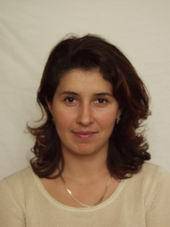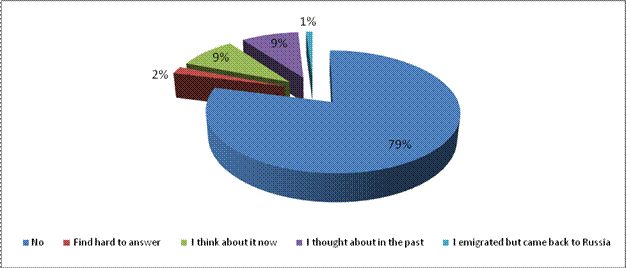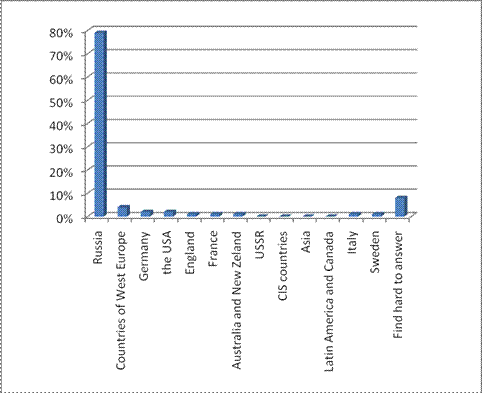

| Home | Our Leadership | Our Economies | Our Wars | Our Perspectives | Our Culture | Links | About |
By Elena Kornilova
During the last ten years, the situation of immigration and emigration in Russia has changed noticably. Now, we can see the decrease in migration activity in both directions. According to data from the Federal State Statistics Service in 1997, more than a half million people (mostly from the countries of Commonwealth of the Independent States (CIS), a half of whom are from Kazakhstan) immigrated to Russia, and in 2007 the quantity of imigrants decreased by half. However, the immigrants from Armenia, Kazazhstan, Uzbekistan, Ukraine, Azerbaijan, Kirghizia and Tadjikistan are still very active. The immigrants from far abroad constitute only five percent of the total immigrants. Of that number, most people come from Germany, with immigrants from Israel and China being almost as common, but the flow from Latvia and Estonia decreased noticably. Also, there is a constant, but very small, inflow from the United States, Greece and Finland.
The new tendencies also are perceptible in the emigration outflow from Russia. The total amount of emigrants decreased from about 230,000 people to 47,000. That means that the outflow reduced five times compared to about 10 years ago. As before, about 60% moved to the countries of CIS, with 40% going far abroad. Moderate quantities of people who emigrate to the countries of CIS move to Kazakhstan, Ukraine, Byelorussia and Azerbaidjan. When going far abroad, the emigrants usually go to Germany, Israel and the United States. Currently, there is no significant outflow to Canada, China, Lithuania, Estonia, Finland, Kirghizia, Georgia or Moldova compared to the end ot the 20th century.
So, in 1997 the amount of immigrants was almost three times more than the amount of emigrants. In 2007 immigrants became almost three times more prevalent.
Different components (emigration or immigration) predominate in the migration policy of a country in different historical periods. There is a special information section about the policies of governments in the publication of the UN Population Division.
According to the table, only 13% of sovereign countries do not regulate the levels of immigration, while 72% of countries do not have any emigration policy or prefer to maintain the level of immigration that they already have. Therefore, the immigration component is the main one that defines the modern migration policy. Contemporary governments are interested in who the arriving migrants are. Their nationality, age, profession, qualifications, family status, etc. are all important factors.
The migration policy in Russia is contradictory. Vladimir Iontsev, a Professor of the Population Department of the Faculty of Economics, Moscow State University, says in his report on the international conference “Migration and Development” that this duality reveals itself in the fact that “on the highest political level it is declared that there is a necessity to have a comprehensive immigration policy and to attract our compatriots and qualified labour resources from abroad, while on the level of its implementation, the government’s attitude towards the management of migration processes still remains largely a police one, and migration itself is viewed mainly as a threat to the national security of Russia. The duality of the attitude towards migration (especially in regard to the Russian speaking population from CIS and the Baltic States), as well as the lack of understanding of the main trends of international migration, led to the situation when in the past years the Concept of Migration Policy has still not been passed.”

Unfortuately, the immigration policy of Russia has had very restrictive characteristics for a long time. Today, we can talk about the simplification of legal immigration. Hopefully, the inflow from the countries of CIS won’t decrease (it’s hard to imagine Russian economics without it). Also, it would be fine if the highly qualified specialists from different countries come to Russia. We also should work on investing in science and high technology development to interest more foreign specialists to work with us.

